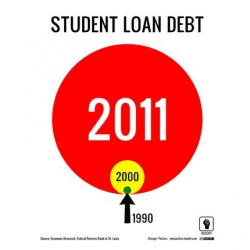I wrote on Monday about ESOP's mortgage strikers. The concept made me think of the student debt strike efforts.
At first glance, those not following what's happening in higher education may think of people complaining about student debt as lazy, entitled college grads who expected a job to fall in their laps. But NYU professor Andrew Ross makes a number of interesting arguments about how rising costs and the loss of living wage jobs that you can get without a college degree basically require young people to go into debt to get a job—something some people call indentured servitude.
He also notes that the same folks who were targeted for predatory mortgages are also targeted for predatory student loans. Ross writes:
But the biggest impact, and the worst excesses of the lending racket, can be found at the low-income end of the higher-education landscape. While I was visiting a community college in the Southwest, a son of immigrants told me he had taken out a series of loans, on the advice of “admissions counselors,” to enroll at a for-profit college, only to discover, on graduation, that the institution was not properly accredited. Unable to transfer credit, he was starting afresh at a new institution, with a new round of loans. For first-generation families like his, access to information is scarce. Priced out of increasingly costly public colleges, he and his peers are falling into the for-profit system, where they are easy prey for shady officials with ties to venal lenders who target high-risk borrowers. As a result, a familiar racial profile emerges: African-Americans are the most indebted of all population groups. Twenty-seven percent of black graduates in 2007–08 borrowed more than $30,000 to pay for college, compared with 16 percent of whites, 14 percent of Hispanics, and 9 percent of Asians.
That story starts to sound like one with a lot of similarity to mortgage justice/bank accountability work. I'd be interested to hear if anyone is explicitly making those connections or linking those two groups.
(Image from Occupy Posters, CC BY-NC-SA)





Comments